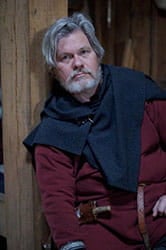Editors' Note: This article is part of the Patheos Public Square on Myth, Imagination, Fairy Tales, and Fantasy. And Faith. Read other perspectives here.
 |
| Credit: Philip Patton |
Though I've toiled in the fantasy quarries for decades now, I've done it mostly in isolation, far from Fandom and its traditions. So it was only recently that I learned the term "Mary Sue."
A Mary Sue, they tell me, is a character in a story obviously intended as an idealized and glorified version of the author. The wimpy, unathletic teenaged boy (that would be me, fifty years ago, and we didn't even have electronic games to fall back on then) recreates himself as a mighty warrior, desired by women. The overweight girl imagines herself as a ninja princess, desired by men. Mary Sues are considered a sure sign of fan fiction.
But that's not entirely fair. In actual practice, every character an author creates is a Mary Sue to some extent. Erling Skjalgsson, the hero of my continuing historical fantasy series, is certainly, to a degree, myself as I like to think I'd have been — if I'd been tall and strong and had better reflexes, but somehow managed not to become a jerk (this is fantasy, remember). But so are all his enemies, including the cannibals in Hailstone Mountain. I have no method for getting into the minds of people different from me, for good or for ill. All I can do is pose the question, "What would I have to be like to have done the things they do?" If "what they do" is murdering small children, the same question goes. Not "what are they like?" but "what do I share with them?"
This is, I believe, universally true. Shakespeare's characters are Mary Sues in this sense. So are Dickens' and Hemingway's and Cormac McCarthy's.
And here, I think, the Christian writer ought to enjoy a distinct advantage. We have no excuse for being as bad in our depictions of evil as we generally are.
It is Christians, after all, who (almost alone in our present age) recognize that "there is none that doeth good, no, not one." Our confessions declare that we are not good people but evil people, saved not by our golden deeds and noble aspirations, but by the work of Someone Else. To look into our own hearts, recognize the evil there, and mine that material for dramatic ore ought to be no problem for us. We've seen our sin (presumably) and repented it. We are under no further illusions about our essential goodness. When a story calls for a monster, we ought to have plenty of models at hand. We ought to have Legions.
I'll make a confession. I've made it before, and in doing so I probably sounded more smug than I have a right to sound. I don't mean it for that purpose.
I don't read much Christian fantasy. I can't stand it.
Not being anyone but myself, of course, I have no way of knowing whether I carry the same narrative beam in my own eye that seems so obvious to me in my neighbors' eyes. But I find most Christian fantasy writing cloyingly "nice." Characters of great villainy may be found there, but they don't convince. They don't even use bad language. Their darkest perversions are only hinted at. They operate in a world obscured by a pink cloud of niceness.
They present to us, in short, Mary Sues in Mary Sue worlds. Christian writers, too often, offer the reader an idealized dramatic stage where the problems aren't too dire, the choices aren't too difficult, and consequences of mistakes aren't too devastating.
It's a little disorienting to find ourselves in a situation where half the time we're defending our holy Book against charges of excessive sex and violence, and the other half we produce books of our own as if under the supervision of our third grade Sunday School teachers.
So what to do about Mary Sue? Here's what I do; for whatever it's worth to you.
First of all, since I must use Mary Sues, I try to keep them real Mary Sues. In fact, I prefer Mary Sue's bigger, uglier sister — call her Mary Sumo.
When I conceived my first novel, Wolf Time, it was a short story, and a bad one. I imagined the main character as the man I'd like to be someday — sophisticated, traveled, highly educated. A man with the intellectual chops to reduce all atheists and agnostics to rubble with his wisdom and lightning wit. A handsome devil, admired by the ladies.
The story changed a lot over the next couple decades (yes, it took that long), but somewhere along the way I realized that my original hero was worthless to me, and to my readers. He wasn't anything like me, and he wasn't like anyone I knew.




